Posted by Elena del Valle on April 21, 2014
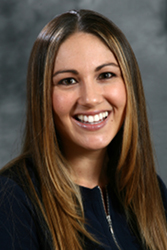
Kristen Schiele, Ph.D., assistant marketing professor, Woodbury University
Photo: Kristen Schiele, Ph.D.
A podcast interview with Kristen Schiele, Ph.D., assistant marketing professor, Woodbury University, is available in the Podcast Section of Hispanic Marketing & Public Relations, HispanicMPR.com. During the podcast, she discusses how companies can utilize online reviews with Elena del Valle, host of the HispanicMPR.com podcast.
Kristen’s research focuses on Marketing Technology such as Online Review Analysis and Big Data Analytics, the Experience and Behaviors of Digital Consumers, and Consumer Culture. Prior to becoming an assistant professor at Woodbury University, she was an adjunct professor at California State University, Fullerton; California Polytechnic University of Pomona; and Vanguard University.
Kristen has over nine years of prior industry experience at The Irvine Company, Susan’s Healthy Gourmet, and as an independent marketing consultant. She is the former chief marketing officer of Fit for Green.
To listen to the interview, scroll down until you see “Podcast” on the right hand side, then select “HMPR Kristen Schiele, Ph.D.” and click on the play button below or download the MP3 file to your iPod or MP3 player to listen on the go, in your car or at home. To download it, click on the arrow of the recording you wish to copy and save it to disk. The podcast will remain listed in the April 2014 section of the podcast archive.
Posted by Elena del Valle on April 14, 2014
The University of Iowa, Office of the Vice President for Research and Economic Development seeks a highly motivated individual to serve as Strategic Communications Director. Working in concert with the Office of Strategic Communications, the Strategic Communications Director will promote and enhance communication regarding research and economic development using traditional Click to read the entire ad Strategic Communications Director
Posted by Elena del Valle on April 11, 2014
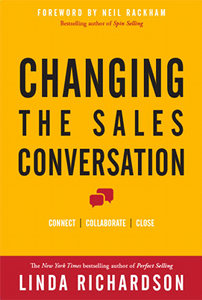
Changing the Sales Conversation
Photos: Sharon Wolmuth
As the market has shifted with social media and technological advances so have consumers. Selling requires a new approach and an increased awareness of client needs and likes, according to some experts. In Changing the Sales Conversation: Connect, Collaborate, and Close (McGraw Hill, $22) Linda Richardson, founder, Richardson, a sales performance company, discusses the issues she considers relevant to the changing sales environment for a target audience of salespeople and sales managers primarily in business to business sales.
”
I introduced Consultative Selling several decades ago and while the tenants of Consultative Selling remain relevant, buyers’ buying habits have dramatically changed and I wrote Changing the Sales Conversation to extend the concepts of
Consultative Selling to foster a new dynamic dialogue for the new sales landscape. The internet and emerging technologies have changed the face of selling so much so that many of the tried and true sales methodologies of just a short time ago are obsolete and some can actually hurt sales,” she said by email in response to a question on why she wrote a book about sales.
The 162-page hardcover book was published this year. It is divided into: Introduction, Futuring: Meta-Preparation, Heat-Mapping: Anticipating Client Need, Value-Tracking: Shaping Solutions, Phasing: Controlling the Process, Linking: Connecting Emotionally, and Opening into the Future. The author explained she wrote it to provide insight into the changes and give models and tools to help salespeople and sales managers succeed in the new world of selling.
”
The key to selling to customers today is to insure that they have a higher level of expertise and skill and having access to resources, research, and tools. Salespeople must have industry, company, and stakeholder knowledge and use tools and research to understand the individuals they are selling to including their cultures and values. I cover this in the chapter on Futuring which is a higher level of preparation. Sales organizations must support salespeople with knowledge sharing, training, and tools,” Richardson said in reply to a question about dealing with diversity in an increasingly global marketplace when trying to build trust.
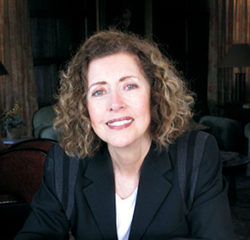
Linda Richardson, author, Changing the Sales Conversation
“One of the key challenges is to get ahead of the opportunity by brin(g)ing ideas to customers. It is important for salespeople to understand what their clients already know because clients are doing research, using social media, and turning to peers and can be half way through the buying cycle before talking to a salesperson. The real challenge I see is having the knowledge and insight to bring ideas to clients rather than get involved late in the sale when the client is advanced and be in heavy competition,” she said in response to a question about the biggest challenge in getting to know a client in today’s environment.
The consultant believes clients expect sales people to be prepared and informed. In the book, she explains that clients are able to tell quickly whether a salesperson is able to create value for them, and that by being informed about a client’s industry, company and stakeholders a salesperson will be competitive. Using tools such as social media, paying attention to their client’s trusted sources and listening to clients to learn about their needs and environment can be important in increasing productivity; and preparing in advance is necessary to succeed, she says.
Richardson teaches sales and management at the Wharton Graduate School of the University of Pennsylvania and the Wharton Executive Development Center. Her previous book, Perfect Selling, was a The New York Times bestseller.
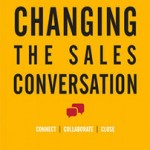
Click to buy Changing the Sales Conversation
Comments:
Filed Under: Books
Posted by Elena del Valle on April 2, 2014
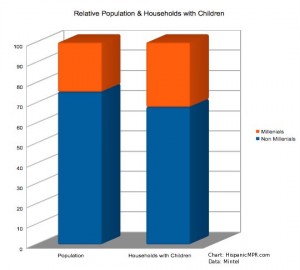
2014 Relative Population & Households with Children – click to enlarge
In the United States, two thirds of Millennials have never been married, according to Marketing to Millennials US February 2014 Executive Summary, a Mintel report. Those who got hitched are in their late twenties. The median age for first marriage is about 29 for men and 27 for women. Thirty-two percent of households with children are Millenial households. At the same time, 43 percent of Millenial households include children.
Although 25 percent of Millenials 25 and older have a bachelor’s degree and 9.5 percent have a graduate degree compared to 11.1 percent of all adults, unemployment among that market segment is higher than for the national average. At the time of the report, 10.3 percent of Millennials between 20 and 24 years old, and 6.8 percent of Millennials aged between 25 and 34 were unemployed. The national unemployment average is 6.5 percent.
There’s a notable difference in household income between younger and older Millenials. While Younger Millennials, those under 25 years of age, have a median household income of $30,604, the median income of Older Millennials, those 25 and older, is about $51,381. The former may be still be studying or in an entry-level job, whereas Older Millennials may be working full-time and more advanced in their career. Mintel researchers believe the 2008 financial crisis caused median income for those aged 15-24 to decline 13 percent between 2007 and 2012, and decline 9 percent for adults aged 25-34.
At the same time, annual spending for Younger Millennials is 40 percent less than for all adults, while among Older Millennials, average expenditures are about 4 percent less. Younger members of the market segment spend less on everything except education. Older Millennials spend a good deal more than all adults on alcoholic beverages and apparel and services, and significantly less on healthcare.














